
The American Dream or Nightmare
Level: intermediate
Age: 15-100
Type:

1. What�s the most important lesson a teacher ever taught you � and was it academic or personal?
What�s the most important lesson a teacher ever taught you � and was it academic or personal?
How do teachers shape the way we see the world beyond textbooks?
Level: advanced
Age: 12-100
Type:

There is / There are affirmative, negative, interrogative forms
A grammar sheet with examples for the There is / There are structure.
Level: elementary
Age: 10-12
Type:
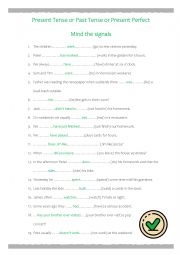
Present, Past or Present Perfect
Fill in the correct form of the verb
Level: elementary
Age: 13-14
Type:

Knock knock trick or treat song
Level: elementary
Age: 5-7
Type:

Country House by Blur
Lots of good vocabulary here. To complete, they need to convert the words into what is sang in the song. Find the lyrics online for the answers. Good luck!
Level: advanced
Age: 15-100
Type:

Review worksheet for ninth formers
This worksheet is helpful to prepare students for the first module related to family. They are also guided to conduct a discussion on the requirements of a healthy functioning family. Pupils are also evaluated on their previous acquisitions related to tenses and comparatives
Level: intermediate
Age: 12-14
Type:

Hello or Goodbye
Hello or Goodbye.
Level: elementary
Age: 6-7
Type:

Future Tenses - Will or Be going to
Level: intermediate
Age: 10-14
Type:

All about me
Level: elementary
Age: 9-100
Type:

Song Activity - Always on My Mind - Elvis Presley - Unscramble
This is a song activity to enhance students� listening abilities. Students listen to a song and put the verse/stanza in the correct order.
Level: elementary
Age: 12-16
Type:

Review;Simple Present or Present Progressive
it �s a goog review for the use of the simple present and the present progressive
Level: intermediate
Age: 12-16
Type:

Body Parts
Flashcards for bodyparts
Level: elementary
Age: 3-7
Type:

Some or Any
Choose some or any
Level: elementary
Age: 6-15
Type:

read short workplace text
Level: advanced
Age: 18-100
Type:
|

University
A power point that shows the words related to university and campus
Level: intermediate
Age: 12-16
Format: PowerPoint

One or Ones - Pronoun exercise
children have to choose which thing is the correct
the first one or the second one
learning the use of ONE / ONES by playing this game
Level: elementary
Age: 10-14
Format: PowerPoint
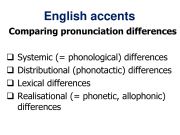
English Accents
Accents such as Australian, cockney, general northern English, etc
Level: advanced
Age: 18-100
Format: PowerPoint

Cheap or Expensive?
A 2-slide powerpoint to practise the adjectives �cheap� and �expensive�, as well as vocabulary relating to common objects such as cars and pencils. On the first slide, students choose whether a statement is true or false. On the second slide, students must decide whether certain objects are true or false and write sentences about them, for ...
Level: elementary
Age: 5-100
Format: PowerPoint

Game Alias
Alias is a word association party game where players give verbal clues to help their teammates guess a target word without using the word itself. Teams compete to guess as many words as possible within a time limit. The game tests creativity, quick thinking, and teamwork, making it a fun and fast-paced challenge for all ages.Enjoy))
Level: intermediate
Age: 8-17
Format: PowerPoint

Martin Luther King Jr.: A Champion for Justice and Equality
Martin Luther King Jr. Day Presentation Slides for Elementary Students
A Champion for Justice and Equality
Celebratin g Martin Luther King Day
Level: elementary
Age: 11-17
Format: PowerPoint

Modern Love Ep 3
It�s a class related to the episode 3 of the series called Modern Love. The class is focused in vocabulary and listening
Level: advanced
Age: 18-100
Format: PowerPoint
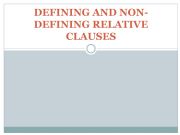
Definining or non-defining relative clause
Level: intermediate
Age: 12-100
Format: PowerPoint

Opinion Essay
Level: intermediate
Age: 13-16
Format: PowerPoint
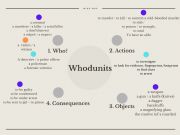
WHODUNNITS Vocabulary
A mindmap on the theme of whodunnits to help students remember the main vocabulary.
Level: intermediate
Age: 12-15
Format: PowerPoint
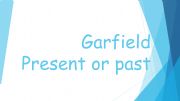
Garfield�s routine Present or Past
Learn about Garfield�s routine present or past.
Level: intermediate
Age: 10-15
Format: PowerPoint

Speaking activity: Would you rather live in a house or an apartment?
This is a speaking activity about houses and different places to live. We can motivate students by asking about their perfect place to live.
Level: intermediate
Age: 15-100
Format: PowerPoint
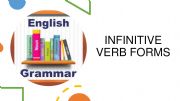
Verbs followed by infinitive (with to or without to)
Before exploring this PPT, you should show a video about 4 ocean, an organisation that cleans up the ocean.It was founded by 2 surfers who quit their jobs to save the ocean. You can also show their website. This is the link to the video I used. It was posted on facebook by David Wolfe https://www.facebook .com/DavidAvocadoWol fe/videos/1015501382 6...
Level: intermediate
Age: 12-100
Format: PowerPoint

Used to or Would?
This is a presentation to talk about the differences between the uses of used to and would when talking about things we did in the past but not now.
Level: intermediate
Age: 10-100
Format: PowerPoint

Traffic Signs
Road signs practice with mustn�t and have to
Level: intermediate
Age: 15-100
Format: PowerPoint
|

American vs British English 2
Find the equivalent American words for the given British words.
Level: intermediate
Age: 12-100

American vs British English
Find the equivalent American words for the given British words.
Level: elementary
Age: 9-100

Social Media Vocabulary
Social Media Vocabulary
Level: elemental
Age: 9-100

Homophones
Complete the sentences using the correct homophone
Level: elementary
Age: 7-9

countries
Different countries of the world
Level: elementary
Age: 14-100

Country
It is a fun game to learn about countries.
Level: elementary
Age: 14-100

Guess the Word or Sentence
Guess the Word or Sentence
Level: elementary
Age: 5-12

Easy vocabulary
To help you learn basic vocabulary
Level: elementary
Age: 3-5

Abstract nouns
Guess the abstract nouns
Level: intermediate
Age: 11-14

Noun, adverb, adjective or verb
Students have to say the sentences for the last question. All or nothing.
Level: intermediate
Age: 10-100

English Program - My Skeleton (a)
English Program - My Skeleton (a)
Level: elementary
Age: 5-6

weeer
dfdfdf
Level: advanced
Age: 7-9

vocabulary 4th grade
adjectives
Level: elementary
Age: 5-8

VERBS! CAN OR CAN�T
CAN OR CANT?
Level: elementary
Age: 8-100

LEARNING A FOREIGN LANGUAGE(2)
There are twenty sentenses to use the words correctly discussing the topic "Learning a Foreign Language"
Level: intermediate
Age: 12-14
|